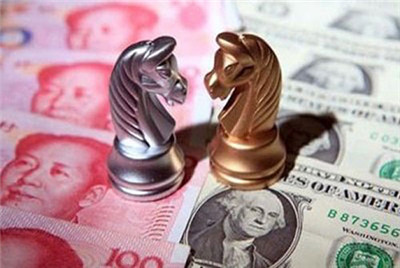(单词翻译:单击)
Shortly before Airbus celebrated the completion of the 100th A320 aircraft at its Chinese final assembly facility in September 2012, the renminbi was trading at Rmb6.4 to the US dollar. Over the following eight months it would strengthen 3 per cent against the greenback to Rmb6.2.
2012年9月,当空中客车(Airbus)庆祝第100架A320飞机在位于中国的总装厂完工时,人民币兑美元的汇率是1美元兑6.4元人民币。在此后8个月期间,人民币兑美元上涨3%,达到1美元兑6.2元人民币。
This week the renminbi did the exact opposite, falling from Rmb6.2 to the dollar to Rmb6.4. It did so in just two days after the Chinese central bank shocked global markets on Tuesday by lowering the renminbi’s daily “reference rate” to the greenback — around which China’s currency is allowed to rise or fall by 2 per cent — by an unprecedented 1.9 per cent.
本周,人民币出现了完全相反的走向,从1美元兑6.2元人民币跌至1美元兑6.4元人民币。这一变动发生在短短两天期间。中国央行(PBoC)周二将人民币汇率中间价史无前例地下调了1.9%,震惊全球市场。中国央行每天设定人民币汇率中间价,允许人民币汇率在其上下各2%的范围内浮动。

Coupled with its pledge to set the reference rate closer to the renminbi’s previous close, the People’s Bank of China raised market expectations for a much more volatile trading environment for the renminbi. According to the central bank’s new rules, the Chinese currency could theoretically rise or fall by as much as 10 per cent over the course of a week.
中国央行还承诺,要让人民币汇率中间价更接近头一天的收盘价。由此中国央行提升了市场对更为波动的人民币交易环境的预期。根据中国央行的新规则,人民币汇率在一周期间的涨跌幅度理论上可能高达10%。
While such moves may be normal for most currencies, similar swings by the renminbi constitute a dramatic change for Chinese companies and foreign investors.
虽然对于多数货币来说,这样的波动可能十分正常,但对于中国企业和外国投资者,人民币若出现类似幅度的涨跌将是戏剧性变化。
For China-based manufacturers, such as Airbus’s “final assembly line” joint venture in the port city of Tianjin, the renminbi’s tumble this week is good news. That is because the joint venture books euro earnings from its European parent while most of its costs are in renminbi.
对于落户中国的制造商——比如空客在港口城市天津的“总装线”合资企业,人民币本周的暴跌是个好消息。这是因为该合资企业的多数成本是以人民币计算的,而盈利却是以欧元从欧洲母公司记账的。
“We try to keep away from these [foreign exchange] fluctuations as much as we can through hedging,” says Andreas Ockel, the joint venture’s general manager. Hedging became increasingly necessary as the euro’s purchasing power fell from more than Rmb10 at the facility’s launch in 2008 to less than Rmb7 this year.
空客天津总装线总经理欧凯翔(Andreas Ockel)表示:“我们试图借助对冲手段,尽可能地规避这类(汇率)波动。”2008年该厂投产时,欧元兑人民币的汇率还是1欧元兑10元人民币,今年已降至1欧元兑不到7元人民币。欧元在华购买力的下降使对冲越来越有必要。
On an inflation-adjusted basis, the renminbi has risen more than 25 per cent against the euro over the past year alone.
仅过去一年,经通胀调整后的人民币兑欧元汇率就上升逾25%。
Airbus’s Chinese airline customers, by contrast, have renminbi earnings but largely foreign exchange-based costs for items such as aircraft and fuel. Their share prices have fallen this week as investors calculated the potential impact of a much weaker renminbi.
相比之下,空客的中国航空公司客户以人民币计入盈利,而飞机和燃料等成本却有很大部分是以外汇计价。本周,随着投资者计算人民币走弱对它们的潜在影响,这些航空公司的股价有所下跌。
China Southern Airlines, which has more aircraft than any other Asian carrier, had more than $16.5bn in dollar-denominated debt at the end of 2014. According to China Southern’s annual report, every 1 per cent fall in the value of the renminbi costs it almost Rmb770m in additional debt servicing costs.
中国南方航空公司(China Southern Airlines)拥有的飞机数量超过其它任何亚洲航空公司。2014年底,该公司背负逾165亿美元的美元债务。根据南航的年报,人民币汇率每下跌1%,该公司就要额外负担近7.7亿元人民币的偿债成本。
Chinese property companies, whose shares have also collapsed this week, are in a similar bind. “Property companies could be hit hard as they issued large amounts of high-yield US dollar bonds offshore to finance land purchases in China,” says Zhou Hao, an economist with Commerzbank. “As [their] income is mostly in renminbi, the depreciation will add pressure on their balance sheets.”
本周股价大幅下跌的中国房地产企业也陷于类似的困境。德国商业银行(Commerzbank)经济学家周浩表示:“房地产企业可能会遭受沉重打击,因为它们为了筹集资金在中国购地,曾在境外发行大量高收益的美元债券。由于(它们)的利润主要是以人民币计算的,这轮贬值将给它们的资产负债表增添压力。”
Mr Zhou estimates that Chinese companies have issued more than 20 per cent of all high-yield dollar bonds. In addition to airlines and property developers, he predicts that Chinese oil companies and commodity traders would also be badly hit by a weaker renminbi.
周浩估计,中国企业发行的高收益美元债券占此类债券总量的20%以上。除了航空公司和房地产开发商,他预计人民币走弱还将沉重打击中国石油企业和大宗商品交易商。
The key question for all companies affected by the renminbi’s unprecedented declines is whether its fall will continue, as the market initially appeared to believe.
对于受到此次人民币空前幅度下调影响的所有企业,关键问题是:人民币会不会继续走低?市场起初似乎是这么认为的。
“Domestic corporates and international investors have realised that a slowing [Chinese economy] and ever-lower interest rates are at odds with a policy of keeping the renminbi strong and steady against the dollar,” says one Beijing-based executive. “They have therefore taken increasingly large positions to gain from a potentially weaker renminbi.”
一位驻北京的高管表示:“国内企业和国际投资者已经认识到,不断放缓(的中国经济)和越来越低的利率,与保持人民币坚挺、保持兑美元汇率稳定的政策是抵触的。因此,他们建立了越来越大的头寸,以便从可能走低的人民币获利。”
China’s central bank has moved to counter such expectations. On Wednesday it declared that there was “no basis for persistent [renminbi] depreciation” and also intervened to support the renminbi.
中国央行已采取行动打消这种预期。周三,该行宣称“不存在人民币汇率持续贬值的基础”,还出手干预汇市以支撑人民币。
On Thursday morning the Chinese currency fell just 0.3 per cent against the dollar, implying that the central bank’s message had been received. In case it had not, it was reiterated by Yi Gang, a central bank vice-governor, at a rare and hastily convened press conference.
周四早晨,人民币兑美元汇率只下跌了0.3%,暗示央行发出的信号已被市场领会。为了以防万一,中国央行副行长易纲在一个罕见而仓促召集的记者会上重申了央行的立场。
That will disappoint many manufacturing companies who are hoping for a short, sharp devaluation of at least 10 per cent. They have been badly squeezed by the renminbi’s 25 per cent rise in value against the dollar since 2005 and ever-higher labour costs.
对众多期待人民币一下子贬值至少10%的企业来说,这将令他们失望。自2005年以来人民币兑美元汇率25%的上升幅度,以及越来越高的劳动力成本,令这些企业承受着极大压力。
“If the devaluation is just a few percentage points, it doesn’t make much difference for manufacturers,” says Gerhard Flatz, who manages a sportswear company that exports from southern Guangdong province. “But if it’s more than 10 percentage points, it will help us fend off competition from the likes of Bangladesh and Vietnam.”
在广东省管理一家生产出口运动服企业的格哈德弗拉茨(Gerhard Flatz)表示:“如果只是贬值几个百分点,那对制造商来说没什么不同。然而如果贬值10个百分点以上,那将帮助我们抵挡孟加拉国和越南等国家的竞争。”
“Right now Guangdong’s manufacturing industry is facing great challenges because of increasing costs,” adds Willy Lin, managing director of a Hong Kong knitwear company. “If the government wants to [help], they need to maintain the devaluation for at least six to 12 months.”
香港一家针织品企业的董事总经理Willy Lin补充说:“目前,由于不断上升的成本,广东制造业正面临巨大挑战。如果政府想(帮忙),他们需要保持人民币贬值趋势至少6到12个月。”
Additional reporting by Wan Li and Gloria Cheung
万丽、Gloria Cheung补充报道


